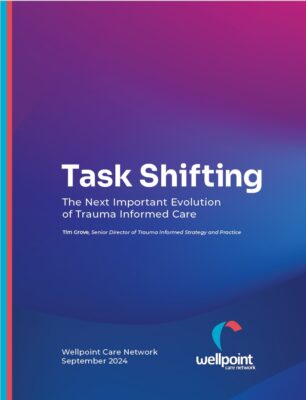Trauma Informed Care: What We’ve Learned Over the Last 15 Years

Wellpoint Care Network has been at the forefront of the Trauma Informed Care (TIC) movement for 15 years. We’re proud of our many contributions to Trauma Informed Care practice, and at the center of our approach are the Seven Essential Ingredients (7ei).
At Wellpoint Care Network, we have trained nearly 80,000 people and have conducted more than 500 sessions to deliver this vital information.
Our Trauma Informed Care curriculum has been well-tested and vetted. It is continuously updated in both content and application. Because of this, we know what works and what truly impacts those who attend our training.
Over the last 15 years, we’ve learned some important lessons about implementing Trauma Informed Care:
- Repetition is critical. We’d love to live in a world where exposing 100 people to core strategies and information once would result in consistent execution. Unfortunately, it just doesn’t work that way. We live in a world that is often resistant to repetition, constantly searching for the next new thing.
However, one-and-done training isn’t effective. The only way to make sure task shifting is successful and that people are truly making an impact is to make sure they are receiving varying forms of repetitious exposure to concepts, ideas, skills, practicing behaviors, etc. - Healing happens everywhere. We are still conditioned to believe that the primary place healing occurs is within the context of a formal professional relationship. While there are many benefits to that — you can ensure interventions are consistent and can more easily and empirically measure them — It is incomplete. The truth is that teaching people simple, practical concepts with enough repetition and seeing them implemented in day-to-day interactions leads to impactful healing. By and large, we have underestimated the potential of this broader healing strategy. That’s why task shifting is key to everything we do moving forward.
- Hope gets buried. Amidst all the mess, pain, tragedy and difficulty, hope can easily get lost. However, hope is remarkably resilient. Like springtime, even when it’s buried, there is often a subconscious awareness that it will sprout. We must keep hope alive if we want to see the change we are working towards.
- Connection is key. As a society, our primary mode of feeling good or of solving problems is to connect with another person. This default wiring is a strength. Connection is key in task shifting. Trust and relationships create healing environments that foster change and progress.
We are at a pivotal moment in the fight against trauma. At Wellpoint Care Network, we believe every person can benefit from being trauma-informed and our experienced trainers are here to guide you.
We invite you to learn more about the importance of task shifting in our latest white paper:

Many Hands Make Light Work: What is Task Shifting?
The Next Important Evolution of Trauma Informed Care
At this pivotal moment in time, Wellpoint Care Network believes EVERY person needs to be equipped and ready to help in the fight against trauma. Learn more about the important concept of task shifting it can help support the work of trained professionals in this free White Paper.
Download Now ( 1 MB PDF )








